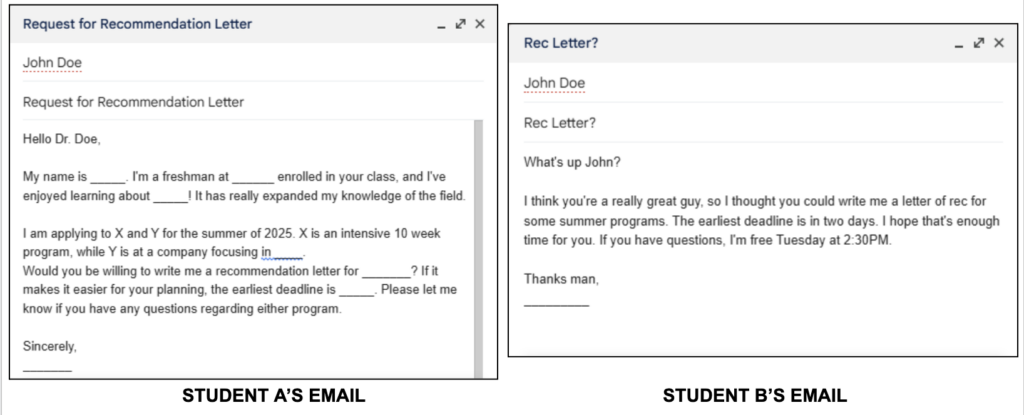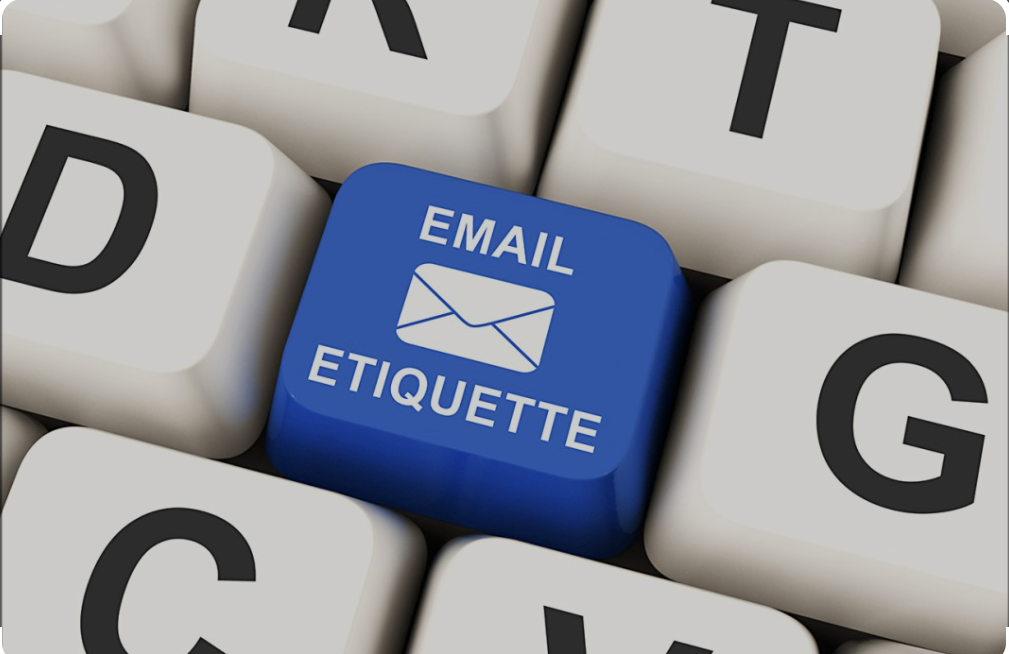Hey all,
Welcome back to The College Blog! This next post is about something that is so incredibly important in the age we live in, both in secondary education and beyond; email etiquette. While this is something already drilled into me from before freshman year of high school, there are adults out there who get passed up purely because of the way they write their emails. I hope that this post will teach how to make a good impression on your professors, potential bosses, and beyond. There is a difference between informal and formal, and it’s imperative to know the difference. In order to set yourself up for success, it’s better to be overly formal and polite than to do the opposite.
I will give an example of informal writing and of formal writing, and I want you to try and figure out which is which without reading the rest of the post. We will pretend that two people, Student A, and Student B, are emailing their professor for a letter of recommendation for a summer program:

Alright, so It’s pretty clear which one is better than the other; the email on the left is more formal. But let’s walk through why it’s better than the other email.
Greeting
You need to make sure you are addressing the person to whom you’re writing with their correct title. When in doubt, it’s better to address them more formally (for example, if you are looking at a science internship, and you are emailing the head supervisor of the lab, if it’s unclear how to address them, it’s better to address them as “Dr.” than “Mr,” “Ms,” or “Mrs”).
It’s evident that Student A knew they were emailing a professor who received a doctorate, while Student B made no effort to properly address that professor. In the last post, I talked about how professors in large universities often only come into contact with some students through email. The first impression of Student B is, therefore, not a favorable one, and Student B could potentially be passed up for that summer opportunity.
Context
In Student A’s email, they inform the professor of 1), who they are, 2), how they know the professor, and 3), they give a compliment, either genuine or ingenuine. Student B’s email provides no such context, so the professor, who, again, might only know Student B through email, has no way of knowing who this person that emailed them is. Sure, there’s a compliment, and that’s all well and good, but is Student B a freshman? Lab TA? Fellow colleague? The email provides none of that information.
What/Where/When
The actual body of the email is very important to the person you’re writing the email to. It’s important to elaborate on the What, Where, and When of what the program or job posting you’re inquiring into. I know, I know—you thought you moved past this in middle school. But that’s just not the case.
Looking at the two examples, Student A gave clear information regarding the programs they were applying to, and when the letters are due. They even provided the focus to each program, so that the professor can write a detailed letter for them. Student B provided a deadline without giving enough notice for the professor to write the letter of recommendation—even if the professor says yes to Student B, a letter written in a day will not reflect the quality of the student.
In terms of meeting for questions, it is best to ask when the person you are emailing is free first—after all, they are doing you a favor, not the other way around. Student B gave an arbitrary meeting time, whereas, Student A left their email open for the recipient to ask to meet.
Request
Language is incredibly important here. Being overly polite and providing a way for them to opt out of writing a letter of recommendation is important. Almost always, they will write you one. Don’t be scared of asking if they would be “willing to” write it. Student B gave no exit, and assumed the professor would be able to write it with their language, while Student A went the former route.
It is also important to title the email properly. Condense what you are asking of the professor or general recipient of your email into one sentence (e.g., if you are asking your neighbor if they can watch your dog and water your plants while you’re on vacation, the email heading could be: “Housesit While Out of the Country?”) Letter of recommendation is also better written out than abbreviated, as Student B has done in multiple areas of their email.
Sign-Off
When addressing someone like your professor, it’s important to, again, be overly polite. I always sign off my emails with “sincerely,” so as to come off as polite as possible.
Student A did this exactly, while Student B presented an example of being overly informal with someone in more of a position of power than them—someone who has control over their success in their desired field.
I hope this walkthrough was a helpful way for you to see what professional emails look like! Even when emailing your teachers in high school, this is important. In the future, you will be communicating with several different people, either above or below you, and in all instances, it pays to be polite.
To your success!
Lara Rosenbach
Class of 2024

